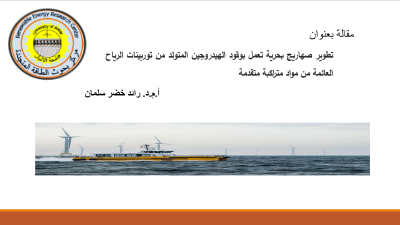| News Details |
Development of marine tanks powered by hydrogen fuel generated by floating wind turbines from advanced composite materials
2022-09-28

By Assist Prof. Raid Khider Salman
The Danish company Vestas has embarked on the first test flight of marine tanks powered by hydrogen fuel generated from floating wind turbines, to be the first experiment in the world to develop a crew of clean fuel-powered marine tankers (CTV).
.jpg)
Floating offshore wind turbines are considered one of the most important and most efficient renewable energy sources, as they operate in open marine environments, in which the generation rate can reach 8 megawatts, and since the marine environment is open, this enables specialized companies to install hundreds of turbines and thus obtain very high capacities. Despite the efficiency of these turbines, the technology of delivering electric power to consumers requires advanced techniques of cable laying and protection, and therefore it can be somewhat expensive. For this reason, these companies have resorted to investing huge electric energy in producing hydrogen gas from the electrolysis process of water molecules to provide clean and combustible fuels without by-products such as greenhouse and harmful gases (such as Co, Co and CH4). Transporting hydrogen gas requires elaborate tanks with high mechanical strength and thermal insulation. These properties are not available in metals, so these companies turned to reinforced plastics or polymeric compounds to manufacture tanks with high specifications of mechanical strength and thermal resistance to be able to transport hydrogen to places of exploitation as fuel to operate machinery and power generators. In order to reduce the cost of operating these tanks and at the same time reduce or eliminate the carbon impact of this process, these tanks have been developed to also run on hydrogen fuel. Thus, the process of generating hydrogen fuel and transferring it to the consumer will be completely clean and will not lead to any environmental pollution and will also contribute to reducing carbon emissions and thus reducing global warming.






